15+ Sample Nanny Contract Templates
-
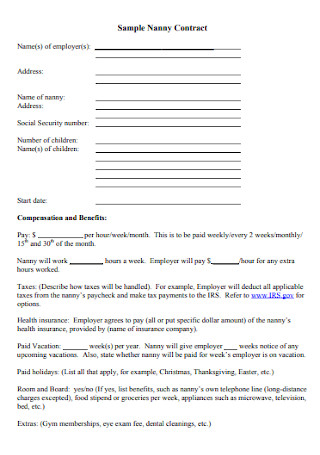
Sample Nanny Contract Template
download now -
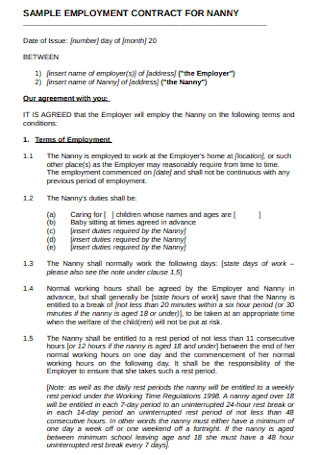
Sample Employment Contract for Nanny
download now -
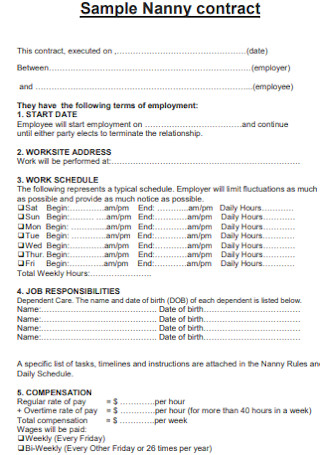
Sample Nanny contract Example
download now -
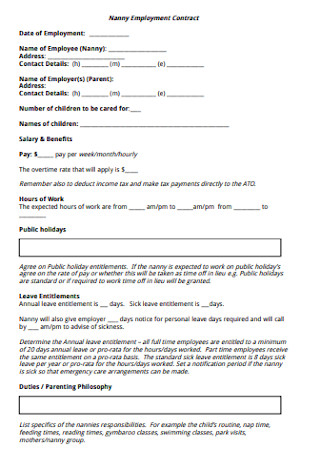
Basic Nanny Employment Contract
download now -
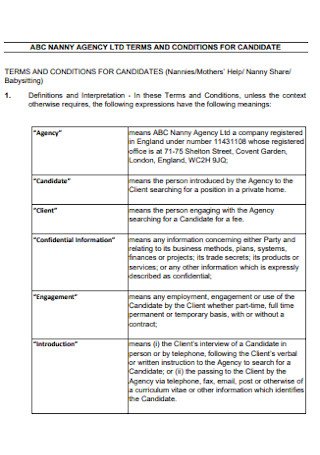
Nanny Agency Contract Template
download now -
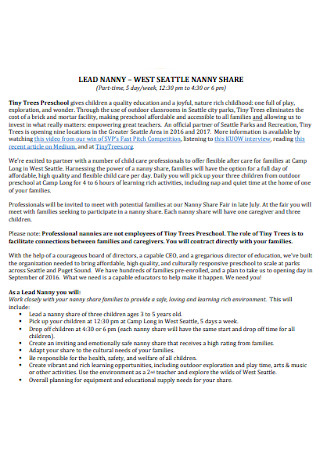
Lead Nanny Contract Template
download now -
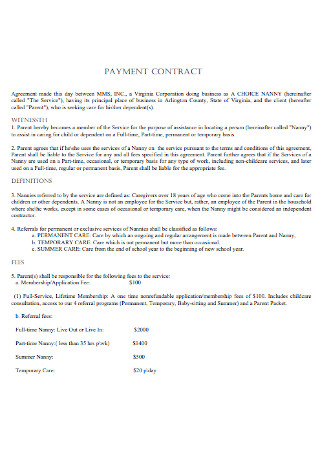
Nanny Payment Contract Template
download now -
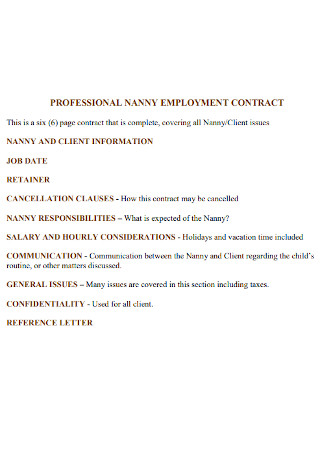
Professional Nanny Employment Contract
download now -
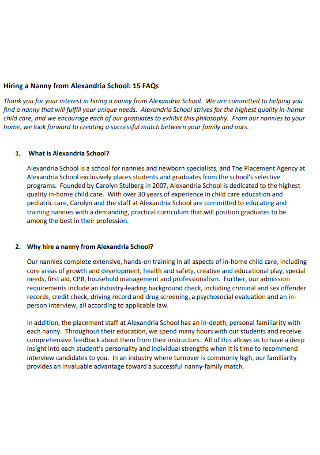
Nanny School Contract Template
download now -
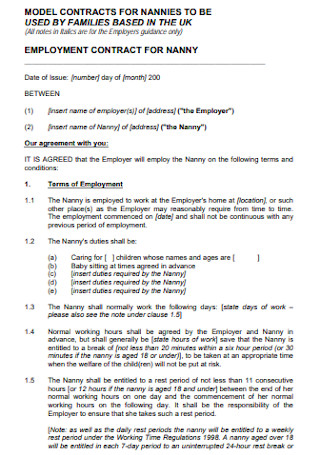
Simple Nanny Contract Template
download now -
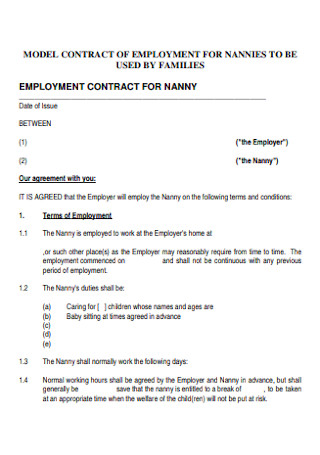
Nanny Family Contract Template
download now -
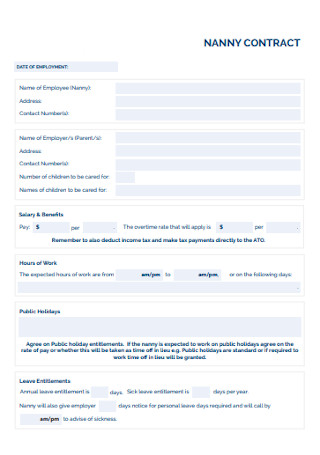
Childcare Nanny Contract
download now -
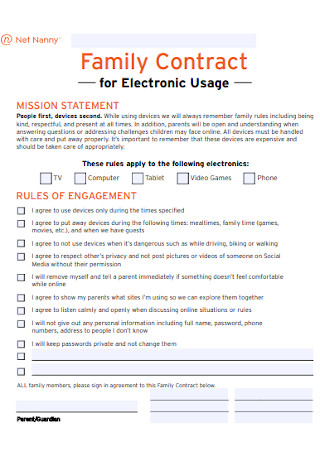
Sample Nanny Family Contract Template
download now -
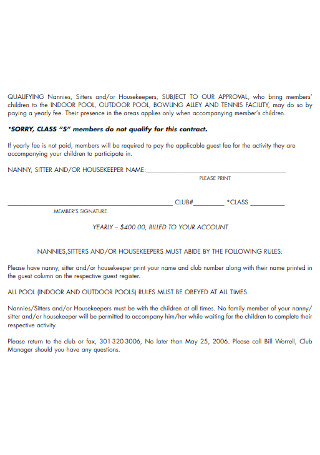
Standard Nanny Contract Template
download now -
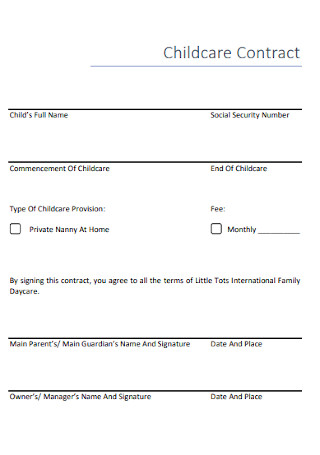
Nanny Childcare Contract Template
download now -
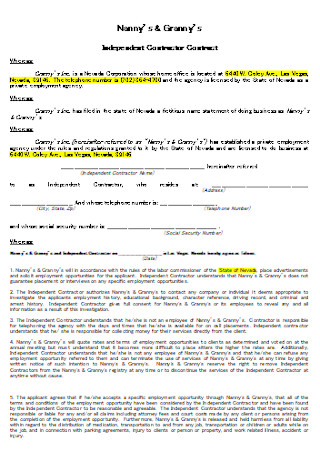
Nanny Independent Contractor Contract
download now
What Is a Nanny Contract?
Nannies, in general, are known for acting as nursemaids; it means they care for kids. Upon hiring a nanny, parents or employers must arrange an agreement with the nanny. Such an agreement will likely tackle how the employer pays the caregivers for their services, which means there is employment involved. Just like any employment contract, it is a legally binding agreement, and as an official document, it proves that it is enforceable by law. Similar to basic contracts, a nanny contract contains the job descriptions, obligations, benefits, house rules, schedules, or vacation leaves. Also, this written agreement form provides clarity since the scope or expectations between the two parties get stipulated under contract.
Did you know that a 2010 study concluded that only less than 3.5% of American families, of every income level, employed a nanny to serve children?
Moreover, the ones who earn more among Americans that hire a nanny were only 3.3%.
On the other hand, Forbes discovered from an upper-class nanny agency and other elite nannies that a nanny could earn up to $180,000 per year, including bonuses and an apartment.
Nannies Before and Today: Why Is a Nanny Contract Important?
You may associate nannies as nursemaids or nurses, which are terms already introduced since the early 1300s. Sometimes, they are called a wet-nurse or a nanny who also breastfeeds a child. Meanwhile, a dry-nurse is a term for a nanny who does not breastfeed. More so, nannies were quite well-known in the British Empire as they serve aristocratic families. Thus, they were called servants too. The sad part was how they work inside the homes of the family, along with other domestic staff. Yet, neither of those classes accept them according to many historians. When you compare nannies from the past and the present, there is a vast difference. The most common examples are how there are formal contracts and agreements as well as protection given not only to employers but also to the caregivers.
People from the past can quickly get away with treating their servants without any respect or paying an insufficient salary to their staff. But, employing caregivers nowadays involves a binding contract. It is highly essential since such a document contains what parties are accountable for, the agreed pay, duties, benefits, and so much more. Any party who fails to observe the terms under a contract may have to face litigation when the innocent party sues. The point here is that even the nanny, who is often regarded as someone of low position, has a right to be protected and heard by the law. Also, spoken agreements back then are not reliable enough since written and signed contracts can act as a form of evidence.
What Should a Standard Nanny Contract Include?
Besides knowing that nanny contracts are important and enforced under the law, it is necessary to familiarize what particular elements get mentioned inside such contracts too. Maybe there are certain facets you forget that are quite crucial for a caregiver agreement. Never fret, though, since you will be guided about what to incorporate inside your contract. Without further ado, here is a list of what to include in a nanny contract:
How To Write a Nanny Contract
According to Slate.com, a research survey conducted by the Center for American Progress stated that only less than 3.5% of families in the U.S., in all income levels, considered to hire a nanny for kids in 2010. When it comes to the highest-paid Americans, it was even said that only 3.3% considered nannies. With that fact, you find less competition when it comes to getting nannies. As an employer, your only concern is to ensure you can afford their service for how long you need them. And most importantly, you should compose a contract with the nanny to agree and sign it. How to manage it, you might ask? Just follow these easy steps:
Step 1: Compose a Well-Thought-Out Plan
How can you expect a contract to work well automatically without putting that much thought and plan into it? The key is to put effort into the planning process to ensure the outcome turns out alright. Moreover, you must discuss and plan the contract with the nanny because if there is something she does not agree with, then you can make some adjustments. Additionally, your strategic plans must be realistic, too, wherein it is achievable. You do not expect one nanny to handle a thousand tasks in a single day anyway.
Step 2: Determine the Parties
A contract always starts with an introduction wherein you inform whoever checks the document that it refers specifically to a nanny contract. Otherwise, the form you composed may get mistaken as a general cleaning contract or any other type of agreement. Next, you identify every party. Employers must provide their full name, address, and contact information. Meanwhile, ask the nanny’s details as well. Besides these information, also recognize if the nanny is self-employed or perhaps, part-time only. By knowing that, every party is sure if the nanny works full-time or not.
Step 3: Insert What to Include in the Contract
Can you recall the list of what standard nanny contracts must include earlier? Schedules, policies, payment details?—do those ring a bell? Yes, those must be incorporated in the form. The process does not get any easier, too, because you can download from our professionally-made templates of sample nanny contracts. Once downloaded, you are guided with what to provide from the top until the bottom page.
Step 4: Be Clear with the Terms
Focus on clarity as that is a general rule. Contracts aim to make deals and agreements understandable, so how can you do that with unclear terms? A tip is to reread what you inputted in the document in case it needs further explanation or a rephrase. An example is the full terms about how to pay a nanny. Calculate for the employee payroll, withholding tax, and other related details. Besides estimating the amount, you better provide precise calculations, so nannies never have to question further. Remember that any payment amount can vary as some get less while other upper-class agencies for nannies earn more, similar to an article of how a nanny may make $180,000 yearly.
Step 5: Keep It Straightforward Too
Indeed, explaining or expounding things can bring more clarity to your contract. But, overdoing it is discouraged too because there is no need to keep things wordy. Wordiness is unnecessary if sentences could have been more straightforward. By making it brief, you give the message directly to whoever checks the agreement form. Even if a contract is short, the main concern is that it is easy to understand in the first place. Once you are confident that the entire content of that sheet is correct and well-reviewed, then it is ready for submission.
FAQs
Is a nanny contract necessary?
If you base on federal law, then a work agreement like a nanny contract is not exactly a requirement. However, writing such a contract is very helpful for both the family and the nanny. With it, lesser conflicts occur, and every task to fulfill will already be provided.
Can I pay my nanny in cash under the table?
Paying cash to your nanny in secret is only going to raise concerns from the IRS. Yes, it is easier to just send out the payment directly to the employee, but you cannot just ignore the employment taxes which the IRS requires.
What makes up a good nanny?
A bunch of qualities makes one a good nanny. Being responsible, trustworthy, nurturing, punctual, flexible, and diligent are a few examples. And while nannies are expected to handle the kids, having the love for children is very important. That way, it will be easy for the nanny to discipline and care for a child.
Even without magical powers, a nanny can be excellent and dependable enough to please an employer. How so? That depends on how prepared and coordinated the nannies and employers are. By discussing the services and forming a nanny contract, both parties receive a mutual understanding regarding their responsibilities. Employers have to respect their employee’s demands to get paid. Meanwhile, employers must not abuse their caregivers since it is these nannies themselves that will take care of their children anyway. As Nancy Jack quoted, “It is a lot easier having four kids and a nanny than three kids and no nanny.”
